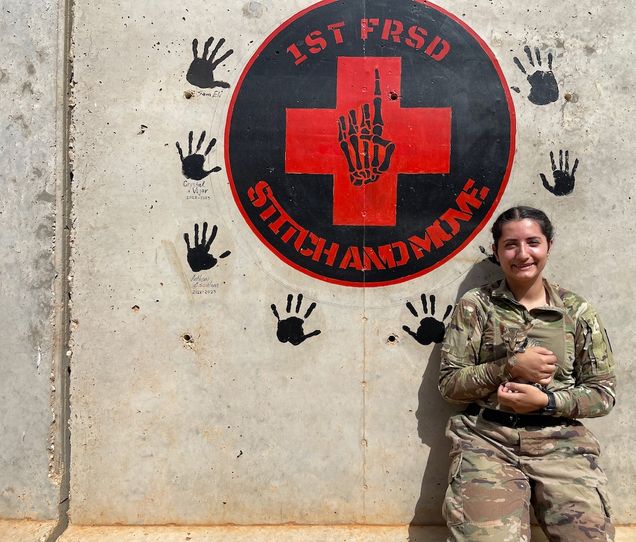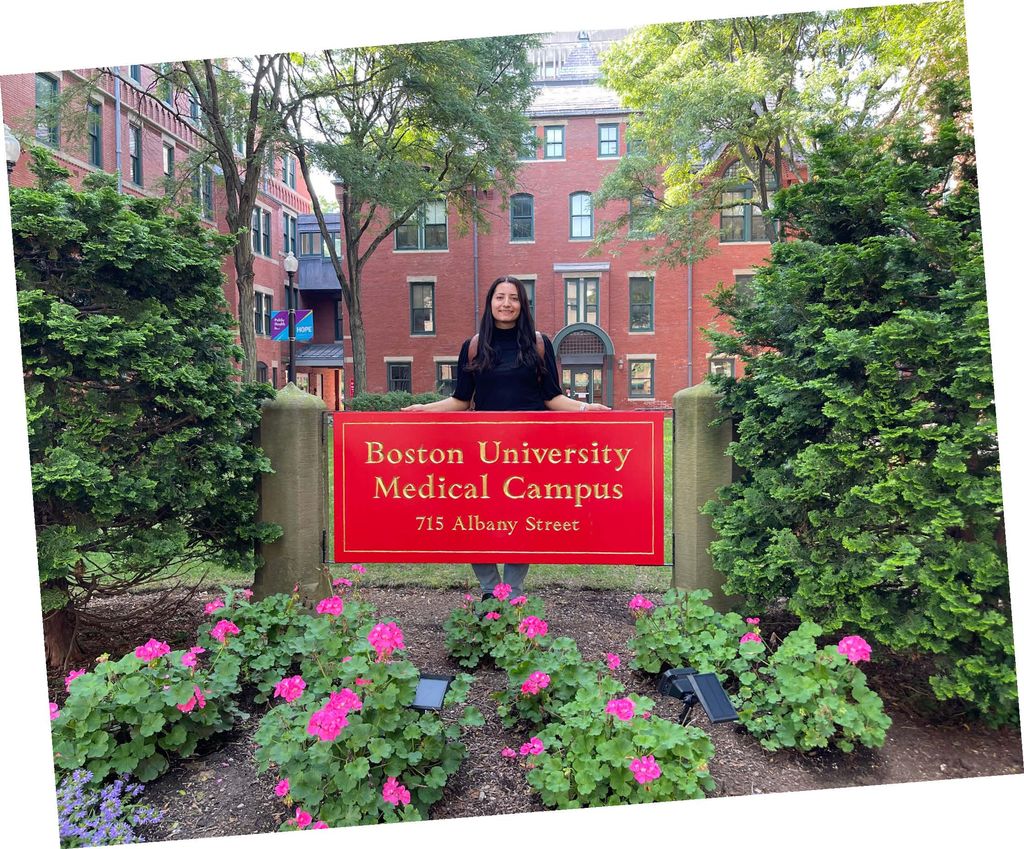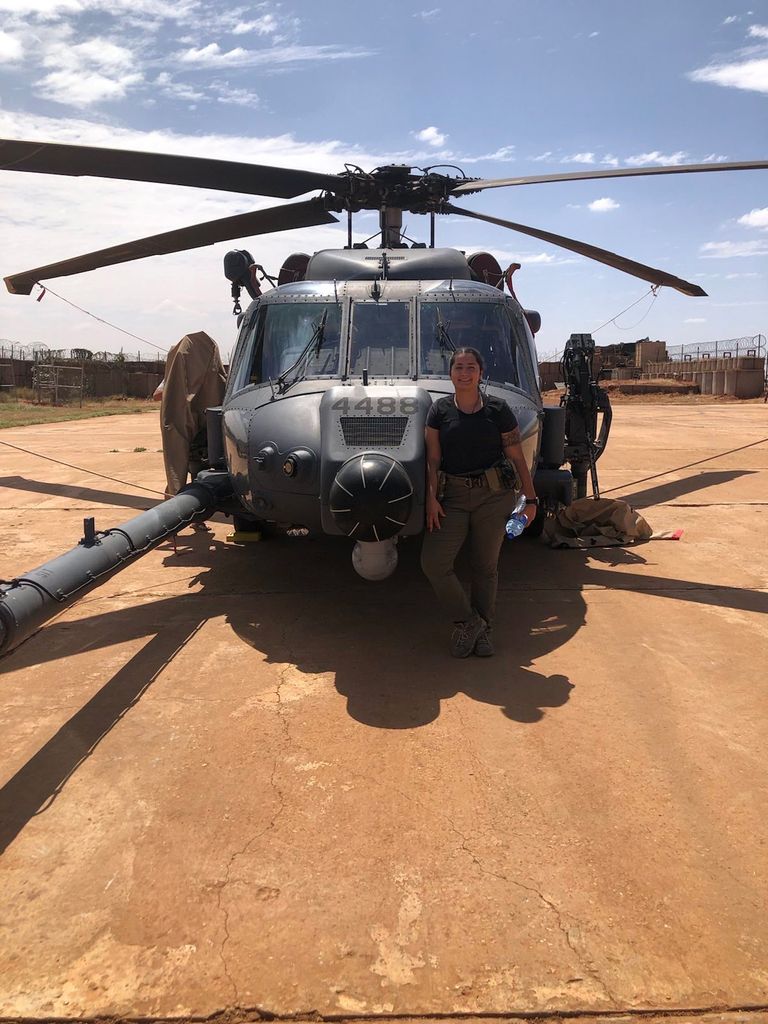GMS Student Spotlight: Crystal Vejar
Crystal Vejar is a second-year student in the Master of Science in Medical Sciences (MAMS) Program.
A first-generation, nontraditional student and a sergeant in the US Army Reserve, Vejar took a unique path to Graduate Medical Sciences. Her journey molded her into a strong researcher and future healthcare professional, as well as a passionate advocate for others.
The Path to Medicine
Raised in Utah as the oldest of three siblings, Vejar knew early on that she had an affinity for science—and for helping those around her.
“I was the oldest child, and I think that instilled in me a strong sense of needing to care for others,” she says.
Vejar attended a small, STEM-focused public charter high school before moving across the country in 2016 to study biomedical engi-neering at New York’s Rensselaer Polytechnic Institute (RPI). After two years, she realized that biomedical engineering was not the right choice for her and decided to make a change.
In 2018, she enlisted in the United States Army, completing basic training at Fort Sill in Lawton, Oklahoma, and surgical technologist training at Fort Sam Houston in San Antonio, Texas, and Walter Reed National Military Medical Center in Bethesda, Maryland.
The following year, Vejar returned to upstate New York to work as a surgical technologist at Samaritan Hospital in Troy and enrolled at nearby Russell Sage College, graduating with a BA in biology and minors in psychology and Spanish in 2021.

In 2022, Vejar deployed to Somalia for nine months, where she performed emergency medical interventions and surgeries with her army unit, the 1st Forward Resuscitative Surgical Detachment (FRSD).
Navigating Deployment
Following graduation, Vejar worked as a surgical technologist for several months while also planning her wedding to her fiancé, whom she’d met during her freshman year at RPI. She also was accepted to matriculate in the fall 2022 MAMS cohort. During her honeymoon in August 2022, however, Vejar received notice that she would soon deploy to Somalia with her army unit, the 1st Forward Resuscitative Surgical Detachment (FRSD). She deployed on November 1 and was stationed at a far-forward post, where she assisted with emergency medical interventions and sur-geries. Vejar returned to the US in August 2023, arriving in Boston the day before GMS fall orientation. Now a sergeant, Vejar periodically travels to Fort Hamilton in Brooklyn, New York, where she trains others in her unit to make sure they are mission-ready at all times.
The Transition to Boston University
From her first day in MAMS, Vejar hit the ground running. On the cusp of its 40th anniversary, the MAMS Program at BU is one of the oldest and most successful Special Master’s Pro-grams (SMPs) in the United States. The pro-gram has helped more than 3,000 students gain admission to medical schools across the country. “I felt I was a nontraditional student,” Vejar says. “I liked that MAMS focuses on making students fit what medical schools look for, from research to courses. I was living in Boston already, so it was a natural fit.” Vejar works in the lab of Matthew Layne, PhD, an associate professor of biochemistry & cell biology. The Layne Lab works to identify novel pathways controlling extracellular matrix synthesis and assembly related to fibroproliferative and connective tissue diseases. Vejar’s master’s thesis research in the lab focuses on the mechanisms of adipocyte fibrosis, the differentiation of the adipocyte progenitor cells, and the pathways and signal-ing mechanisms they go through to become adipocytes and fibrotic adipocytes.
 Vejar matriculated into the MAMS Program in Fall 2023 and currently studies the mechanisms of adipocyte fibrosis in the lab of Matthew Layne, PhD.
Vejar matriculated into the MAMS Program in Fall 2023 and currently studies the mechanisms of adipocyte fibrosis in the lab of Matthew Layne, PhD.
Giving Back to the Community
Vejar feels fortunate to have always had “amazing mentors,” of which there are “too many to count.”
“Being a first-generation student and the oldest in my family, and the first to learn English, very often led me to being put into new and confusing situations,” she says. “I learned to look for help and rely on mentors who had been through the same things, or who could help me find the right people.”
“I think it can be empowering and add to your experience in ways that can ultimately be the reason you become successful.”
The support she received growing up, as a student and in her professional career, led her to become a mentor to others. At GMS, Vejar works with the Community Catalyst Center (C3), founded in August 2021 to help students acclimate and feel a sense of belonging early in their GMS programs.
Vejar is a peer mentor for gFIRST, for first-generation students; gMAV, for mili-tary-affiliated and veteran students; gSOC, for students of color; and C3’s newly launched Nontraditional Graduate Student Community.
In early 2024, Vejar became C3’s student intern, playing an integral role in brainstorming and executing C3 programming. Along with her internship, she serves as a student representative on the GMS Diversity, Equity & Inclusion Steering Committee. Her volunteer work, lived experiences, and passion for medicine have shaped her perspective as a future healthcare professional.
“I think I’ve felt the many struggles American immigrants go through in the US healthcare system, starting with the language barriers, the financial stressors, the complicated forms and appointments to figure out, insurance, and more,” Vejar says. “Being my parents’ translator from an early age really shaped my perspective.”
 Vejar enlisted in the United States Army in 2018, where she trained as
Vejar enlisted in the United States Army in 2018, where she trained as
a surgical technologist following basic training.
The Next Steps
“I am excited to move on to my next career goal, to become a physician,” says Vejar, who already has received one med-ical school acceptance and interviewed at several others. She also hopes to remain involved in research.
As Vejar prepares to depart GMS, she advises future students to stay persistent and resilient.
“When the path is as long and difficult as it is for us premed students, deviation from the traditional timeline is very scary,” she says. “But I think it can be empowering and add to your experience in ways that can ultimately be the reason you become successful.”